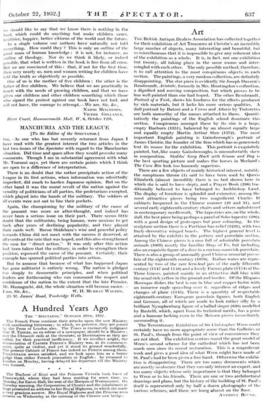MANCHURIA AND THE LEAGUE
[To the Editor of the SPECTATOR:1 SIR,—As one who has but recently returned from Japan I have read with the greatest interest the two articles in the last two issues of the Spectator with regard to the Manchurian situation. Did time and space allow they would provoke many comments. Though I am in substantial agreement with what Mr. Tsurumi says, yet there are certain points which I think are open to a differenee of interpretation.
There is no doubt that the rather precipitate action of the League in its first actions, when information was admittedly imperfect, did much to harden Japanese opinion. But on the other hand it was the moral revolt of the nation against the venality of politicians of all parties, the proletarians excepted, which played into the hands of the military. The soldiers at all events were not out to line their pockets.
Again, the championing by the military of the cause of the peasant was more an after-thought, and indeed has never been a serious issue on their part. There seems little doubt that the militarists, being human, were anxious to get back after years of declining popularity, and they played their cards well. Baron Shidehara's wise and peaceful policy towards China did not meet with the success it deserved, at all events at the rate that was hoped, and this also strengthened the ease for " direct action."- It was only after this action had been taken that the military, in order to strengthen their position, espoused the cause of the peasant. Certainly, their example has spurred political parties into action.
But to assume that because of what has happened Japan has gone militarist is entirely wrong. The. nation is pledged too deeply to democratic principles, and when political leaders are forthcoming who can command the respect and confidence- of the nation to the extent that the late- PreMier, Mi. Hamaguehi; did, the whole situation will become easier.-:-.














































 Previous page
Previous page